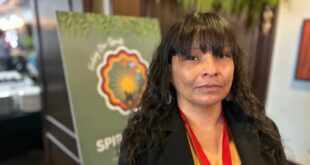Books published in 2008 or earlier removed from school library amid confusion around new equity-based process

Harry Potter, The Hunger Games and Roll of Thunder, Hear My Cry.
Those are all examples of books Reina Takata says she can no longer find in her public high school library in Mississauga — which she visits on her lunch hour most days.
In May, Takata says the shelves at Erindale Secondary School were full of books, but she noticed that they had gradually started to disappear. When she returned to school this fall, things were more stark.
"This year, I came into my school library and there are rows and rows of empty shelves with absolutely no books," said Takata, who started Grade 10 last week.
She estimates more than 50 per cent of her school's library books are gone.
In the spring, Takata says students were told by staff that "if the shelves look emptier right now it's because we have to remove all books [published] prior to 2008."
Takata is one of several Peel District School Board (PDSB) students, parents and community members CBC Toronto spoke to who are concerned about a seemingly inconsistent approach to a new equity-based book weeding process implemented by the board last spring in response to a provincial directive from the Minister of Education.
They say the new process, intended to ensure library books are inclusive, appears to have led some schools to remove thousands of books solely because they were published in 2008 or earlier.
Parents and students are looking for answers as to why this happened, and what the board plans to do moving forward.
Weeding books by publication date raises concerns
The process of weeding books from a library isn't new.
Libraries across the country follow weeding plans to dispose of damaged, moldy and outdated books and to ensure their collections remain a trusted source of current information.
But Takata, who is of Japanese descent, is concerned weeding by publication date doesn't follow that norm and will erase important history.
"I think that authors who wrote about Japanese internment camps are going to be erased and the entire events that went on historically for Japanese Canadians are going to be removed," she said.
"That worries me a lot."
Libraries not Landfills, a group of parents, retired teachers and community members says it supports standard weeding, but shares Takata's concerns about both fiction and nonfiction books being removed based solely on their publication date.
The group is also concerned about how subjective criteria like inclusivity will be interpreted from school to school in the later stages of the equity-based weeding process.
Tom Ellard, a PDSB parent and the founder of Libraries not Landfills, said teachers reached out to them to help raise awareness about the weeding process.
"Who's the arbiter of what's the right material to go in the library, and who's the arbiter of what's wrong in our libraries? That's unclear," he said. "It's not clear to the teachers who've provided us this material, and it's not clear to me as a parent or as a taxpayer."
Ellard says he's talked to the parent council, his son's principal and his school board trustee. He's also contacted members of the provincial government, but says he hasn't received a substantial response about what happened in the spring and how the process is intended to work.
School board defends process
CBC Toronto requested an interview with the PDSB to discuss how the weeding process works and how the board plans to proceed in the wake of concerns from parents and students. A spokesperson said staff were not available to speak as they were "focusing on students and school families this week."
The board did not address questions about empty shelves, the volume of books removed and reports about weeding books based on the date of publication.
Instead, the board issued statements explaining that the process of weeding books from school libraries was completed in June and has always been a part of teacher librarian responsibilities within PDSB and at school boards across the country.
"Books published prior to 2008 that are damaged, inaccurate, or do not have strong circulation data (are not being checked out by students) are removed," said the board in its statement.
If damaged books have strong circulation the board says they can be replaced regardless of publication date, and older titles can stay in the collection if they are "accurate, serve the curriculum, align with board initiatives and are responsive to student interest and engagement."
"The Peel District School Board works to ensure that the books available in our school libraries are culturally responsive, relevant, inclusive, and reflective of the diversity of our school communities and the broader society," said the board.
Weeding a response to minister's directive
CBC Toronto reviewed a copy of the internal PDSB documents Ellard's group obtained, which includes frequently asked questions and answers provided to school staff by the board, and a more detailed manual for the process titled "Weeding and Audit of Resource in the Library Learning Commons collection."
The documents lay out an "equitable curation cycle" for weeding, which it says was created to support Directive 18 from the Minister of Education based on a 2020 Ministry review and report on widespread issues of systematic discrimination within the PDSB.
Directive 18 instructs the board to complete a diversity audit of schools, which includes libraries.
"The Board shall evaluate books, media and all other resources currently in use for teaching and learning English, History and Social Sciences for the purpose of utilizing resources that are inclusive and culturally responsive, relevant and reflective of students, and the Board's broader school communities," reads the directive.
Neither Education Minister Stephen Lecce's office, nor the Education Ministry, would comment on PDSB's implementation of the directive when contacted by CBC Toronto.
How weeding works
PDSB's "equitable curation cycle" is described generally in the board document as "a three-step process that holds Peel staff accountable for being critically conscious of how systems operate, so that we can dismantle inequities and foster practices that are culturally responsive and relevant."
First, teacher librarians were instructed to focus on reviewing books that were published 15 or more years ago — so in 2008 or earlier.
Then, librarians were to go through each of those books and consider the widely-used "MUSTIE'' acronym adapted from Canadian School Libraries. The letters stand for the criteria librarians are supposed to consider, and they include:
- Misleading – information may be factually inaccurate or obsolete.
- Unpleasant – refers to the physical condition of the book, may require replacement.
- Superceded – book been overtaken by a new edition or a more current resource.
- Trivial – of no discernible literary or scientific merit; poorly written or presented.
- Irrelevant – doesn't meet the needs and interests of the library's community.
- Elsewhere – the book or the material in it may be better obtained from other sources.
The deadline to complete this step was the end of June, according to the document.
Step two of curation is an anti-racist and inclusive audit, where quality is defined by "resources that promote anti-racism, cultural responsiveness and inclusivity." And step three is a representation audit of how books and other resources reflect student diversity.
When it comes to disposing of the books that are weeded, the board documents say the resources are "causing harm," either as a health hazard because of the condition of the book or because "they are not inclusive, culturally responsive, relevant or accurate."
For those reasons, the documents say the books cannot be donated, as "they are not suitable for any learners."
A PDSB spokesperson said the board supports its schools "in the disposal of books in a responsible manner by following Peel Region's recycling guidelines." Peel Region allows for the recycling of book paper, as long as hard covers and any other plastics are removed first and put in the garbage.
Books removed based on date, board heard
It was during the first stage of the new equitable curation cycle, that Takata, Libraries not Landfills, and at least one trustee, say some schools were removing books strictly based on publication date.
CBC Toronto recently reviewed a recording of a May 8 board committee meeting focused on the new equitable weeding process. In it, trustee Karla Bailey noted "there are so many empty shelves," when she walks into schools.
"When you talk to the librarian in the library, the books are being weeded by the date, no other criteria," Bailey told the committee.
"That is where many of us have a real issue. None of us have an issue with removing books that are musty, torn, or racist, outdated. But by weeding a book, removing a book from a shelf, based simply on this date is unacceptable. And yes, I witnessed it."
Bernadette Smith, superintendent of innovation and research for PDSB, is heard responding on the recording, saying it was "very disappointing" to hear that, because she said that's not the direction the board is giving in its training for the process.
Dianne Lawson, another member of Libraries not Landfills, told CBC Toronto weeding by publication date in some schools must have occurred in order to explain why a middle school teacher told her The Diary of a Young Girl by Anne Frank was removed from shelves. She also says a kindergarten teacher told her The Very Hungry Caterpillar had been removed as well.
"She has read it to her classes for years, they love it," Lawson said, referring to the Eric Carle picture book.
"I can't find any sedition in it, or any reason why you would pull this book."
Process 'rolled out wrong,' trustee chair says
Trustee and chair of the board, David Green, told CBC Toronto the weeding process itself "rolled out wrong."
That's why he says trustees briefly paused the process until the board could get a better understanding of what was actually going on.
A motion was passed at a May 24 board meeting to ensure that, going forward, those weeding books during the anti-racist and inclusive audit in the second phase of the curation cycle would need to document the title and reason for removal before any books were disposed of.
"We have to make sure that we are meeting the needs of the students and not just rolling something out because we were told to do it," said Green.
When it comes to removing all books published in 2008 or earlier, Green said the board of trustees has heard that, too.
"We have asked the Director [of Education] again to make sure that if that is taking place, then that is stopped, and then the proper process is followed," he said.
Green also said they have plans to communicate with parents about the weeding process.
In the meantime, students like Takata are left with half-empty shelves and questions about why they weren't consulted about their own libraries.
"No one asked for our opinions," she said. "I feel that taking away books without anyone's knowledge is considered censorship."
*****
Credit belongs to : www.cbc.ca
 MaharlikaNews | Canada Leading Online Filipino Newspaper Portal The No. 1 most engaged information website for Filipino – Canadian in Canada. MaharlikaNews.com received almost a quarter a million visitors in 2020.
MaharlikaNews | Canada Leading Online Filipino Newspaper Portal The No. 1 most engaged information website for Filipino – Canadian in Canada. MaharlikaNews.com received almost a quarter a million visitors in 2020.







